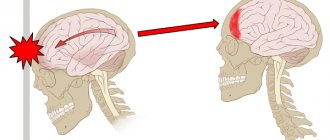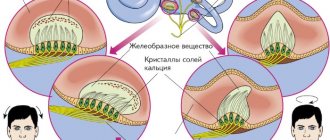When a person suddenly becomes dizzy, they feel as if their body and surrounding objects are spinning. Sometimes he is aware of the direction in which the movements occur (systemic dizziness), sometimes he is unable to accurately determine the direction (non-systemic).
Often in this state there is instability of space, with staggering, trembling, a feeling of uncontrolled movement of the legs with throwing back of the head - as if falling into an abyss. This is roughly how patients describe a condition called “dizziness.” How to relieve dizziness at home quickly worries many.
This condition can occur when there is inconsistency between the work of the central nervous system and the organs of vision. This is also a signal to consult a doctor so as not to miss the onset of the development of a disease, for example, vegetative-vascular dystonia. The term dizziness is often used to describe symptoms such as fainting, weakness, and nausea.
For many, this often causes discomfort, creating serious problems and interference in daily life. Let's figure out how you can help yourself. There are many ways. As a neurologist, I often recommend them to my patients in medical practice.
The most common causes of dizziness
What reasons cause dizziness most often? The following classification of the causes of dizziness is taken in abbreviation from the lecture “Evaluation of the Dizzy Patient” (“Examination of a patient with dizziness”) by the famous specialist in the problems of the vestibular system Timothy C. Hain [1].
The most common causes of dizziness:
I. Otological (i.e. ear) – 40-50% of causes of dizziness
1. Benign paroxysmal positional vertigo is the most common cause of vertigo 2. Meniere's disease 3. Vestibular neuronitis (neuritis), labyrinthitis 4. Perilymphatic fistula and dehiscence of the superior semicircular canal (defects of the capsule of the inner ear) 5. Ototoxic damage (damage to the vestibular apparatus by toxic substances, including some medications)
II. Neurological (10-30% of causes of dizziness)
1. Poor circulation in the vertebrobasilar system (transient ischemic attack, stroke) is the most common cause among neurological dizziness. 2. Age-related disorders of the vestibular apparatus. 3. Migraine 4. Cervical vertigo (associated with neck problems) 5. Low cerebrospinal fluid pressure syndrome (when there is a leak of cerebrospinal fluid, for example after an injury)
III. General medical problems (5-30% of causes of dizziness)
1. Changes in blood pressure, arrhythmia 2. Hypoglycemia (low blood sugar) 3. Effects of medications (eg, blood pressure lowering drugs) 4. Infections (eg, acute respiratory infections) 5. Vitamin B12 deficiency
IV. Others (15-50%)
1. Psychiatric 2. Hyperventilation (consequence of rapid breathing) 3. Dizziness of unknown origin
The above classification is not generally accepted and, of course, is not complete. There are other causes of dizziness. However, it allows you to get an idea of the diseases that cause dizziness most often.
Treatment
With complaints of dizziness, you can contact such specialists as neurologists, cardiologists, endocrinologists , but it is better to first visit a therapist. For dizziness (including, but not primarily, since this is a secondary symptom), a certain course of medication is prescribed.
To relax and at the same time gently raise your tone, you can train your vestibular apparatus by performing light exercises:
- Sit with your back straight, turn your head to one side and lie down without changing your position. Movements are smooth.
- Sit down again, turn your head in the other direction.
- Do the exercises for a few minutes, 5 – 7 times a day.
Medicines for dizziness
To treat persistent dizziness, medications are prescribed, their use depends on the symptoms:
- antihistamines : Meclozin, Promethazine, Pipolfen, Diphenhydramine;
- tranquilizers for sedation: “Diazepam”, “Lorazepam”;
- sedatives: “Andaksin”, “Seduxen”;
- against nausea and painful vomiting: Cerucal, Metoclopramide.
Possible causes of dizziness
The condition “when everything is topsy-turvy and the ground disappears from under your feet” can occur in a person of any age, including children. This mainly occurs when vascular changes occur in the brain.
Women are more likely to experience dizziness during menopause, during the menstrual cycle, and when pregnant. If the child does not have a hereditary predisposition, then such conditions will be temporary and will cease after hormonal changes have ended.
In addition to vascular phenomena, dizziness occurs in the following cases:
- with oxygen starvation;
- in a state of prolonged excitement, worry, fear;
- during fasting or exhausting diets;
- if you stay in stuffy, unventilated rooms for a long time;
- with an inadequate supply of systems and organs with blood, leading to a malfunction of the circulatory system (against the background of panic attacks, fears);
- physical or mental fatigue;
- heatstroke;
- dehydration of the body, causing malfunction of blood vessels.
This phenomenon is caused by the supply of distorted information to the brain by the inner ears, which is very different from what the tactile and auditory organs should receive.
In addition to the above reasons, dizziness occurs due to various diseases.
Let's list the main ones:
- severe blood loss;
- migraine;
- a sharp jump in blood pressure;
- vascular pathologies of the brain;
- central nervous system disorders;
- bacterial infection;
- epilepsy;
- osteochondrosis of the cervical spine;
- renal failure;
- oncology;
- with a concussion or head injury;
- affected vestibular nerve;
- anemia;
- with a lack of glucose levels in the blood plasma.
After the examination, the doctor may often recommend consulting with an oncologist, ophthalmologist, endocrinologist, otolaryngologist, gynecologist or other specialists. Taking into account the diagnostic examination, a comprehensive treatment is prescribed to help get rid of the problem.
Preventive measures for dizziness
Several recommendations will help strengthen the walls of blood vessels, restore blood circulation to the brain and prevent attacks of vertigo. Namely:
- Exercises to train the vestibular system.
- Proper diet: minimizing fried, spicy, salty foods.
- Quitting smoking and alcoholic beverages.
- Active lifestyle.
- Get adequate sleep of at least 8-10 hours/day.
Timely diagnosis will help detect the presence of the disease and eliminate its symptoms - vertigo. For mild pathological conditions caused by overwork or excessive stress, medications that can be purchased without a doctor's prescription will help.
Medicine for dizziness should be selected taking into account the nature of the syndrome and the cause that provoked its occurrence. If the drug is not effective, it is necessary to change it to another modern drug that is more suitable for the patient.
Symptoms of dizziness
In any case, there is no need to panic. Because even a completely healthy person can feel dizzy. If this happens several times, and you know the reason for this condition (prolonged exposure to the sun, standing at a high altitude, sudden change in body position, etc.), take the feeling calmly. It is enough to sit in a calm environment, and everything will return to normal.
But when dizziness becomes frequent, interferes with your life and work, and causes inconvenience, you should think about visiting a specialist.
Especially against the background of such symptoms:
- hearing loss;
- increased attacks of dizziness;
- severe nausea;
- frequent rhythmic twitching of the eyes when trying to look up or to the side;
- tinnitus.
The head may become dizzy with sudden turns of the head, low/high blood pressure, poisoning, high fever, diarrhea, and prolonged vomiting.
An experienced doctor will recognize dizziness based on your complaints and recommend further actions.
Provoking factors
This disease can be caused by a number of reasons. Let's list the main ones:
- Physical fatigue. When a person is tired, he often gets headaches. If he feels dizzy, this indicates the need for rest. Perhaps the patient should take a break from work and get some sleep. After full restoration of strength, a person feels rested and, most importantly, healthy.
- Psycho-emotional stress. Many people have seen children who are in a state of psycho-emotional stress. Typically, parents always react to their child’s stress, and rightly so, because this condition is almost always accompanied by severe dizziness. Stress and neurosis can provoke dizziness not only in children, but also in adults. To get rid of this illness, which arose due to nervousness, it is necessary to return to a comfortable psychological state.
- Poor nutrition. This provoking factor can be divided into a large number of causes. Firstly, dizziness can occur due to a lack of glucose in the human body. Secondly, this disease provokes prolonged fasting. The thing is that if the brain does not receive the microelements it needs along with the blood, this will lead to dizziness. And the human body receives useful microelements along with blood.
- Dehydration. When a person has exhausted himself with physical activity for a long time, he may feel dizzy. The thing is that along with sweat, fluid is released from the skin, hence the dehydration of the body.
- Not following a daily routine.
- Pregnancy. Many pregnant women, due to early toxicosis, may feel dizzy, especially in the morning. How to get rid of dizziness during pregnancy? Unfortunately, this disease is difficult for pregnant women to stop. But if the girl does not make sudden movements, then the chance of dizziness is reduced.
- Prolonged exposure to the sun. Dizziness, in this case, is one of the side effects of heat stroke. A hat helps prevent this disease.
- Frequent sudden movements.
A group of factors associated with diseases should also be highlighted separately. There are a number of diseases that are accompanied by the manifestation of this symptom.
Patients suffering from one of these ailments cannot get rid of dizziness at home.
Attempts to treat the disease outside of a medical institution will not bring any results.
If a person often feels dizzy and at the same time has an increase in body temperature, there is a high risk of infectious damage to the brain or vestibular system.
In this case, the patient must be urgently hospitalized. Only qualified specialists can provide assistance to him.
First aid and treatment
Mostly, dizziness is not considered an independent disease. Therefore, the cause that causes it is eliminated. Often this condition resolves on its own due to the brain's ability to adapt to altered information coming from the inner ear, using other mechanisms to maintain balance.
If the cause is impaired functioning of the inner ear, vestibular rehabilitation is an effective remedy. This is a modern method of physiotherapy, consisting of a set of exercises that simulate the load on the vestibular apparatus. This brings the organ to balance, causing accelerated adaptation of the brain to existing disorders.
For dizziness caused by inflammatory and infectious processes, drug treatment is prescribed. For many patients, I advise a diet that limits the intake of certain foods that cause fluid retention in the body.
There are also severe cases that affect a person’s performance. In this case, an operation may be prescribed - with the intersection of the destroyed ear labyrinth. This significantly reduces the vestibular disorder, but leads to hearing impairment.
Contact your doctor immediately:
- if your head feels dizzy for more than half an hour; dizziness occurred for the first time, but has symptoms of vomiting, nausea;
- if you simultaneously experience a state of fainting (sweating, pain in the chest, trembling of the limbs, darkening of the eyes, increased heart rate);
- when, simultaneously with dizziness, weakness appears in one limb or half of the body, sensitivity decreases.
Important information. Early diagnosis of the disease completely allows you to normalize the condition and get rid of attacks.
But what to do if your loved ones or relatives begin to feel dizzy? Giving first aid is easy. Place the person in the supine position with their shoulders and head on the pillow. This prevents the spinal arteries from bending. Make sure he doesn't turn his head from side to side.
If possible, open a window or window. You can place a cold compress on your forehead. If a person does not feel better, an irregular heartbeat begins, the pulse increases to 100 beats per minute, and vomiting begins, call an ambulance. Consultation with an audiologist is necessary.
Associated symptoms
Usually, in addition to loss of orientation in space when tilting the head, other accompanying symptoms are also disturbing.
Such, for example, as:
- noise and ringing in the ears;
- short-term loss of vision;
- hearing impairment;
- attacks of nausea;
- gagging;
- rapid pulse;
- black spots before the eyes;
- weakness in the body;
- trembling in the limbs, sometimes convulsions;
- aversion to loud sounds, bright lights and strong smells;
- increased sweating.
If you notice at least 2-3 of these signs, then a visit to the doctor is required, as serious health problems are possible.
Dizziness – vestibular gymnastics
Vestibular exercises effectively help get rid of dizziness. However, before doing such exercises, you need to find out who it is suitable for and what the rules are for doing it so as not to cause harm to health.
Often with vestibular vertigo, the brain independently “adapts” to the disorder of the sensory organs. Gradually it disappears completely. If the problem becomes persistent, I recommend a set of special exercises to patients. Indications for its implementation are pathologies associated with the ear region, previous traumatic brain injury, post-stroke periods, osteochondrosis.
Not everyone is allowed to do gymnastics on their own. This can lead to worsening of the condition in patients with ischemic brain damage. In addition, there is a high probability of compression of the vertebral arteries. Only a specialist can determine whether such exercises can be performed or not. The doctor will give recommendations, select the right complex, and tell you whether you can self-medicate or with the help of a specialist.
Therapeutic exercises for dizziness have contraindications. These include:
with disorientation (with symptoms of vestibulopathy);
- for diseases of the cardiovascular system, lungs;
- if a person feels unwell after classes.
Otherwise there are no contraindications. But exercise should be carried out according to an individually developed program by a doctor and under his constant supervision.
Vestibular exercises for dizziness - main principles
It is important to follow all recommendations in order to perform the treatment complex correctly. These include:
- classes are held at a convenient time, twice a day, at intervals of 7-8 hours;
- It is forbidden to do exercises during a cold or infectious disease;
- execution should take place in measured rhythms, not cause shortness of breath or fatigue;
- the complex can be started only after the doctor’s permission;
- loads increase gradually as the body gets used to them;
- training is carried out in sportswear and shoes that do not restrict movement or cause discomfort;
- To achieve the effect, charging is done daily for one and a half to two months (with adjustments by a specialist every 14 days).
Each exercise is performed for five minutes. The full complex includes exercises for balance, head, and eyes.
Instructions for exercises for balance
Performed in a standing position. Each exercise is done in at least 12 approaches.
- The patient tilts so as to pick up any object from the surface. Then sit down smoothly on the floor.
- You need to get up from a sitting position.
- Tilt again, but now you need to place the raised object at eye level.
- The object is transferred from one hand to another, while the original position does not change.
- The object is then moved under the knees from one hand to the other.
Eye exercise instructions
A prerequisite is a fixed position of the head.
- First, the eyes slowly rise up, and then drop down (at least 12-15 approaches).
- The gaze is fixed on objects placed from the body to the right and left. At the same time, the eyes are directed in one direction or the other, focusing on objects for a few seconds.
- A finger is slowly brought to the eyes, which must be held in front at a distance of 45-50 centimeters.
Head exercise instructions
The complex includes three exercises. Each is performed in several approaches - at least 15 times.
- Bend your head forward, eyes open. Then back, closing your eyes.
- At first the bends are done slowly, then faster and faster.
- Turn your head to the right (eyes open), to the left (eyes closed). Make turns in the other direction.
- The last exercise is rotation, with the shoulder joints raised.
Rules for vestibular exercises at home
Exercise therapy gymnastics, if performed at home, must be carried out in compliance with the rules.
- The first week is exercises for the head. At first, you may feel a slight feeling of nausea. It's okay, it will go away with time.
- Second week – body tilts – right/left, back/forward. It is important to control your breathing.
- After three weeks, light boxing is introduced. With your elbows bent, imagine that there is an invisible opponent in front of you.
- The next stage is adding forward/backward walking (20 repetitions each).
Methods for dizziness under the supervision of a doctor
Possible reasons
Feeling dizzy after sleep can be due to a number of different reasons: from simple overwork and lack of sleep to serious disruptions in the functioning of the body.
The main provoking factors are considered:
- osteochondrosis of the cervical spine;
- hypoglycemia;
- vegetative-vascular dystonia;
- paroxysmal positional vertigo;
- orthostatic hypotension;
- anemia.
Spinal problems
The simplest and most common causes of vertigo and poor health due to problems with the spine are the following factors: a high pillow or an uncomfortable position during night sleep and when falling asleep, too sudden rise when getting out of bed.
In addition, a fairly common pathology that provokes dizziness in the morning after waking up is osteochondrosis of the cervical spine. It is characterized by displacement of the cervical vertebrae, which for a long time puts pressure on the vertebral artery that supplies the brain. Every morning, when you tilt or turn your head, the blood supply is disrupted and a state of temporary ischemia occurs, which causes coordination problems.
Vertigo can also be caused by Kimmerli's anomaly, in which an additional arch is identified at the first cervical vertebra. It compresses the vertebral artery, resulting in a disruption in the flow of oxygen and blood to the brain, which causes dizziness in the morning.
Hypoglycemic conditions
Morning dizziness after waking up can also be caused by a drop in blood glucose levels. This condition often occurs in patients with diabetes mellitus who violate their diet, insulin regimen, and oral hypoglycemic medications. A sudden onset of hypoglycemia can cause you to faint.
Another risk factor for the development of a hypoglycemic state is grueling low-carbohydrate diets for the purpose of losing weight, abnormal physical and mental stress.
Vegetovascular dystonia
The condition of vegetative-vascular dystonia (VSD) is characterized by an abnormal vascular response to signals and impulses of the central nervous system. When the vessels need to narrow due to a smaller volume of incoming blood, they expand, and when they need to expand, they, on the contrary, narrow.
This causes headaches, dizziness and shakyness in the morning, darkening of the eyes, nausea, and even vomiting. Dizziness can be so severe that it leads to loss of consciousness.
Positional vertigo
The manifestation of benign paroxysmal positional vertigo (BPPV) is associated with disruption of the normal functioning of the vestibular apparatus.
The reasons for its development are:
- TBI (traumatic brain injury);
- viral infection of the vestibular apparatus;
- inner ear surgery;
- taking antibiotics that are ototoxic to the body;
- spasm of the labyrinthine artery.
Symptoms of the disease most often appear in men and reach their peak clinical manifestations during the day. Upon awakening, when a person gets out of bed, a strong feeling of dizziness suddenly arises, the space around sways and begins to storm, weakness sets in, and nystagmus appears. Symptoms develop to the point where he feels nauseous or even sick (vomiting occurs). The patient can often clearly identify the affected side, since dizziness is only possible when turning the head in a certain direction.
The attacks are not accompanied by hearing or vision impairment and can be repeated several times during the day, lasting no more than 30 seconds.
Orthostatic hypotension and low blood pressure
Orthostatic hypotension is a sharp drop in blood pressure when changing body position. This condition can even cause loss of consciousness.
When lying down, the heart rate and pressure in the blood vessels decrease, and when standing up, they increase. The main symptoms of hypotension are severe dizziness, a feeling of weakness, staggering, and blurred vision. Symptoms usually occur when getting out of bed, are short-lived and go away within a few minutes. Patients suffering from VSD, especially adolescents, are predisposed to the occurrence of orthostatic hypotension.
As for blood pressure, its decrease leads to the fact that the tissues and cells of the human body are not saturated with oxygen and important nutrients. As a result, when it drops, the main symptom of low blood pressure appears - dizziness. Patients may become suddenly dizzy and experience severe headaches, even fainting. They may also feel suddenly nauseous, which subsequently leads to vomiting. In addition, patients' palms and feet begin to sweat, their vision becomes dark, and they experience a feeling of weakness and increasing fatigue.
Blood pressure may drop due to improper use of medications, in particular diuretics and hypertensive drugs. Irregular use of medications leads to deterioration of renal function and the onset of progression of hypotension.
Anemia
Dizziness in the morning with anemia occurs due to low hemoglobin content in the blood and insufficient nutrition of the tissues of the vestibular apparatus.
Common symptoms of anemia are mild dizziness, nausea, fainting, unsteadiness of gait.
Such patients often complain that when getting out of bed, their vision suddenly darkened and a feeling of weakness appeared.
Other reasons
Dizziness is not always caused by pathology of the central nervous system. It can also occur due to food poisoning. When toxic substances enter the bloodstream, the body's immune system is activated and its protective functions are activated. Thus, in order to remove foreign toxic substances, the patient experiences increased sweating, cold sweat, shaking chills, nausea and vomiting. Against the background of these symptoms, a lot of fluid leaves the body, which disrupts water and electrolyte balances. This disorder is manifested by dizziness, weakness, drowsiness, adynamism, and a shaky gait may occur.
Similar symptoms occur with ARVI. The head may feel dizzy due to inflammation of the middle or inner ear, which affects the vestibular system. If otological diseases are added to the symptoms of ARVI, this can subsequently lead to complete deafness. The course of intoxication syndrome in a child often manifests itself with complications of a more severe degree than in adults.
Also, dizziness in the morning can occur as one of the signs of heart rhythm disturbances (tachycardia, bradycardia, sick sinus syndrome). In such cases, it manifests itself due to insufficient blood flow to the brain, which causes hypoxia and neuronal death.
Elderly patients, starting from 60 years of age and older, are susceptible to atherosclerosis and dyscirculatory encephalopathy. Dizziness often develops as an indicator of a discirculatory process. During it, the elastic functions of blood vessels and the volume of circulating blood flow decrease in the presence of stenosis.
Meniere's disease is a disorder that causes not only constant dizziness, but also periodic hearing loss. The disease also manifests itself as nausea, hyperhidrosis, ringing and noise in the ears. The patient often cannot understand where he is, what he is doing, the space around him floats.
In women, dizziness is often caused by heavy menstruation, which results in anemic syndrome. Premenstrual syndrome, during which irritability, nausea and lack of appetite appear, may also be a risk factor.
Dizziness often occurs as a result of taking certain medications. These include anticonvulsants, sleeping pills, antihistamines, diuretics, adrenergic blockers, fluoroquinolones and some tranquilizers.
Epley maneuver
The complex is prescribed if the patient has benign positional paroxysmal vertigo. The first procedures are carried out with a specialist. If vertigo is caused by other problems, the Epley maneuver is performed exclusively with a doctor. If you are unable to turn your neck after a heart attack or recent injury, exercise is prohibited.
- The patient sits facing the specialist.
- The doctor turns his head with a sharp movement to the left (45 degrees).
- Then the patient should lie down so that the head is lower than the body.
- In the lying position, the doctor turns his head to the right, but now by 90 degrees.
- The patient lies on his right side.
- The specialist turns his head to the left.
- After half a minute has passed, you need to quickly take a sitting position.
Usually after such a maneuver the dizziness goes away immediately. Sometimes the maneuver needs to be repeated.
Drug treatment
If dizziness occurs as a result of the development of a disease or pathology, the patient is prescribed medication.
What medications should you take to get rid of this disease?
It is impossible to answer this question unambiguously; it all depends on the specific disease that the patient is diagnosed with, on the degree of its severity and on other factors.
It is important that drug therapy is comprehensive, because this is the only way the patient can be cured.
With the help of such therapy, it is important not just to stop dizziness. It is necessary to influence the cause of its occurrence.
So, what exactly can doctors prescribe for a patient who often feels dizzy?
- Tranquilizers that reduce a person’s general level of anxiety. Tranquilizers are prescribed only as a last resort, if the illness occurs due to severe stress.
- Antihistamines, for example, Promethazan.
- Sedative medications. If a person’s head is spinning due to nervousness, then he should calm down. This can be done with the help of sedatives. For example, you can drink “Fitoset” or “Glycine,” which are mild sedatives.
- Antiemetic drugs. Prescribed only if the patient experiences vomiting.
Semont maneuver
- Pose sitting on a chair, feet on the floor.
- The patient turns his head 45 degrees (to the healthy side).
- Then lie down on the couch on the affected side of the head, holding it with your hands.
- Remains in a lying position until all symptoms of dizziness go away.
Let's summarize vestibular exercises
We have repeatedly said that dizziness not only causes discomfort, but also affects the quality of life. The set of exercises given can get rid of the problem. Therefore, before starting drug therapy, consult a specialist about the advisability of exercise therapy.
How to cope with dizziness yourself
In most cases, it is not difficult to cope with this condition on your own.
- The effectiveness of apple cider vinegar. Research has proven that this product can prevent surges in blood pressure, which are common causes of dizziness. It controls glucose levels. The recipe is simple. Dilute half a teaspoon of apple cider vinegar in half a glass of water and drink the drink. You can start with half a serving, gradually increasing the dosage. Course – until optimal effect. The drink will provide overall health benefits.
- If you feel dizzy suddenly. When you feel that the ground is slipping away from under your feet, you need to take emergency measures. Soak a cloth in cold water diluted with vinegar and place it on your forehead. If everything “floats” in your eyes, concentrate your gaze as much as possible on any stationary object. This will not only prevent fainting, but will also be a good workout for the vestibular system. If you are prone to fainting, have candy, cookies or other sweets with you. Even small sweets eliminate attacks.
- Water. If you don’t have the strength to get up, a few sips of water will come to the rescue, which you need to drink in small portions while taking an intense breath.
- Horse chestnut. A proven folk method and an excellent preventive measure. The tincture is being prepared. To do this, add half a tablespoon of horse chestnut flowers to one glass of boiling water. Then leave to infuse for 15 minutes. Drink the strained drink twice a day - in the morning and at night. You can also prepare a healing tincture. To do this you will need 100 grams of alcohol (40%). Forty grams of dried chestnut flowers are filled with alcohol. The product is left to brew in a dark place for 7 days. To treat dizziness, take 10 drops of tincture daily.
- “Tame” anxiety or stress. Negative emotions can change the rhythm of the pulse, hormonal levels, and breathing rate. This leads to nausea and dizziness. Anxiety neurosis, such as a phobia or panic attack, is also a common cause of fainting. It is important to learn how to manage your condition. Direct everything towards reducing stressful situations at work and at home. Do not enter into conflicts with the people around you. By learning to control yourself, you will get rid of attacks. Try to do this using these tips : change your place of work if your field of activity irritates you, conflicts arise in the team, you are not satisfied with the conditions of payment or work, you understand that you cannot withstand physical exertion; learn to meditate, use breathing exercises, massage (we'll talk about it later), do yoga, tai chi; For some, it is advisable to switch to working remotely or change work schedules, this will give them the opportunity to relax more;
- Do not enter into conflicts with loved ones, no matter how difficult the situation may be. If conflicts are inevitable, consider exchanging an apartment.
- Drink enough fluids. Long-term (chronic) or acute lack of water leads to dehydration, and therefore dizziness. Often the body does not have enough fluid due to high fever, diarrhea, vomiting, severe blood loss, or during the hot season. The brain begins to experience oxygen starvation, leading to seizures. To prevent this from happening, follow the rules : drink at least 1.5-2 liters of liquid per day (about seven to eight glasses), especially in the heat or during intense physical activity; do not drink alcoholic drinks, energy drinks or those containing coffee, reduce sweet carbonated waters and tea to a minimum.
- Easily digestible foods. Many people feel dizzy when their blood sugar levels drop sharply. This problem is especially faced by diabetics or people who ignore their morning meals. The brain needs sufficient glucose levels. For diabetics, I recommend snacks in the form of light, quickly digestible foods. To help your sugar level rise quickly, the following foods are suitable: sweet fresh fruit (ideally blueberries, bananas); freshly squeezed fruit juices; bakery products from wheat; natural honey If blood sugar levels are constantly elevated, dizziness occurs due to increased acidity and dehydration. This is typical for those who do not treat diabetes.
- Proper awakening. A brief fainting state causes a sharp rise after a night's rest. Especially in older people (orthostatic collapse) or those who have low blood pressure. Sudden rises, including from sitting positions, put pressure on the arteries to ensure sufficient blood flow to the brain. The result is severe weakness. It is necessary to get up slowly, it is advisable to lean on some object to maintain balance : if you get up from a lying position, first sit down, wait a few minutes, then rise to your feet; chronic hypotension often develops against the background of constant use of medications, such as drugs for erectile dysfunction, vasodilators; Hypotension is also caused by dehydration due to peripheral nerve disease.
- Try to sleep longer. Poor or insufficient sleep creates a feeling of “fog” in the head. With chronic lack of sleep, not only dizziness occurs, but also depression, nervousness, and hypertension. Insomnia is often characteristic of psychological trauma, chronic pain, constant anxiety, and is accompanied by severe snoring. Falling asleep in complete silence can help you get enough sleep (if this is not possible, use earplugs). Make it a rule to drink a glass of warm milk with honey at night. But give up strong tea and coffee drinks: allow yourself to sleep longer on holidays and longer weekends; A good sedative is a decoction of medicinal chamomile (can be replaced with magnesia, melatonin, valerian root).
- Be careful to prevent head injury. Any damage to the brain is a common cause of dizziness. Injuries can occur as a result of sports, accidents, or concussion. A concussion is characterized not only by dizziness, but also by foggy consciousness, vomiting, ringing in the ears, and aching headaches. They belong to cumulative injuries, that is, they are characterized by an increase in damage. We must try to avoid injury to the head.
- the risk of getting a concussion increases when playing hockey, boxing, American football, rugby;
- When driving in vehicles, do not forget to buckle up;
- do not engage in activities that cause shaking, increased stress on the neck and head (roller coaster rides, jumping, jumping, etc.).
Choice of anti-vertigo drugs
Anti-dizziness medications are designed to eliminate unpleasant symptoms. The most commonly prescribed drugs are:
- tranquilizers;
- diuretics;
- calcium antagonists;
- vestibulometric medications;
- antihistamines;
- cerebral vasodilators;
- adrenergic blockers;
- ACE inhibitors;
- anti-inflammatory non-steroidal drugs;
- and other drugs prescribed to restore blood circulation and stabilize metabolic processes in neurons.
Depending on what causes the dizziness, the doctor will recommend medications that have special characteristics that can neutralize the pathological condition, as well as the factors that provoked it.
For vertigo that occurs due to diseases of the heart, blood vessels, as well as the central nervous system, cerebral circulatory disorders, the following medications are prescribed:
- Medicine "Tanakan" or "Flunarizine".
- The drug "Veroshpiron" or "Betaserc".
- Medicine "Vinpocetine" or "Dramina".
- Medicine "Torekan" or "Cinnarizine".
- The drug "Meclozin", "Diazepam" or "Relanium".
All of these medications must be taken for dizziness in full courses, constantly monitoring blood pressure readings in order to promptly prevent a hypertensive crisis.
What to drink for nausea and dizziness caused by gastrointestinal diseases or eating disorders:
- "Motilium", "Festal".
- "Omez", "Mezim".
- “Pancreatin”, “No-shpa”.
- "Creon", "Pangrol".
If dizziness is accompanied by bloating, heartburn should be taken with Gaviscon Forte or Maalox.” For vertigo that appears due to problems with the spine, the doctor may recommend Betaserc.
If you feel dizzy, before taking the pills, it is necessary to establish the nature of the pathological condition in order to eliminate the very cause of the syndrome, and not just its symptoms.
Health care
If you realize that dizziness is becoming regular and you cannot cope with the attacks on your own, you need qualified medical help.
Check with your specialist to see what side effects the medications you are taking may cause. Most medications have the side effect of dizziness. This especially applies to diuretics, sedatives, drugs for high blood pressure, antidepressants, and strong painkillers. Strong antibiotics can also cause brain fog.
It is also important to know how medications interact with each other. Simple tips to help cope with attacks:
Taking any medication should not be stopped abruptly without consulting a specialist. Do this gradually or switch to a product with a similar effect;
Predicting drug interactions is often difficult, since many complex chemical processes take place in our bodies.
Discuss the symptoms of ARVI and influenza with a neurologist or therapist. Some viral diseases affect the sinuses, lungs and inner ear. This leads to a decrease in mucus, congestion in the inner ear, and respiratory tract, causing fainting symptoms. If loss of balance is one of these reasons, it will go away on its own within a few days (at the same time as the disease).
- do not forget to drink more fluids during infectious diseases;
- learn to blow your nose correctly when you have rhinitis, rinse your sinuses with a solution of water with the addition of sea salt;
- To clear the narrow eustachian tubes that connect the middle ear to the throat, try plugging your nostrils, then try to exhale. This will help normalize the pressure on both sides of the eardrum (congestion often causes loss of balance);
- check to see if you have migraines, anemia, or allergic reactions.
High and low blood pressure is also a reason to get checked. Normal blood pressure is 120/80. A major potential danger is caused by hypertension, the symptoms of which are similar to heart disease. In addition, this condition can lead to chronic dizziness.
- a micro-stroke or micro-infarction causes seizures as a result of less oxygen entering the brain;
- Medicines for hypertension are often the “culprits” for making your head “spun”, no matter how paradoxical it may sound.
It's worth checking your blood sugar levels. Diabetes, hypoglycemia, as I said, cause loss of balance. To reduce attacks, you can reduce the daily dose of medications taken (if recommended by your doctor). It is important to control blood glucose levels, which is the brain's main source of energy. The normal blood sugar level is no higher than 5.5 millimoles per liter.
- The analysis can be done independently at home; for this purpose, glucometers are sold in pharmacies. It is necessary to measure on an empty stomach in the morning. Normally, the value does not exceed 6.9 millimoles per liter;
- A short-term increase in glucose levels occurs when eating large amounts of sugary foods, which are contraindicated in diabetes, and this can also cause dizziness.
Check with an otolaryngologist. Fainting attacks can be due to vertigo, labyrinthitis, or Meniere's disease. Vertigo often goes away on its own, since the organ has the ability to adapt to the existing conditions.
- vertigo can be quite severe, causing symptoms such as vomiting, headaches, nausea, loss of consciousness, unsteadiness of gait;
- positional vertigo (benign) develops due to mobility of otoliths, which begin to irritate the semicircular canals, provoking an attack of dizziness.
Visit a chiropractor or osteopath. Such highly specialized specialists understand the specifics of spinal diseases and effectively restore the mobility of the joints connecting the vertebrae. You may have pinched or displaced joints in the cervical region, causing dizziness. Manual manipulation will quickly eliminate the pinching, correcting existing displacements.
- It happens that after one procedure, everything is restored. The attacks go away completely. Although, in most cases you will need to undergo from 5 to 10 massage sessions.
Often the chronic course of the disease is caused by arthritis of the upper cervical region, especially rheumatoid arthritis.
Important information. If you experience frequent dizziness, vomiting, or fainting, consult a doctor immediately. If the attacks are regular, consultation with a specialist is also necessary; this may be a serious cardiovascular pathology.
Effective acupressure
And finally, how you can relieve dizziness in 5 minutes using traditional Chinese medicine.
The massage consists of light pressure on points located on the body and face, which quickly improve well-being and relieve vomiting and fainting.
There are several such points.
- Place your left palm on top of your right, with the inside facing out. In this case, the little finger should touch the edge of the hand. The point is located in the center of the line on which the index finger of the right hand swings. Massage for a few minutes. Repeat for the other hand.
- Place your right thumb between your left index finger and thumb. It is important that the “strip” between the phalanges of the thumb is placed on the crease between the fingers. The point is located in the place where the fingertip touches the hand. It is necessary to massage points on both hands.
- Two points that are located on the sides of the knuckles of the middle fingers, in the places where the phalanges meet the joints. It is necessary to massage simultaneously on each side (two points), applying light pressure.
It is important to know! This massage helps with dizziness that occurs as a result of a sudden change in body position, nausea, and motion sickness. If the attacks are caused by a disease, it cannot replace treatment.
Danger of dizziness
Dizziness when changing body position is dangerous because of its suddenness and unpredictability. It can overtake you at any time, both at home and while driving on the street or driving a car.
This can result in serious injuries, including traumatic brain injuries. Dizziness is especially dangerous for people who live alone. In this case, the person may simply not wait for help.
Injuries often occur if you become dizzy in the bathroom. For safety, do not close the door tightly and warn your loved ones.










